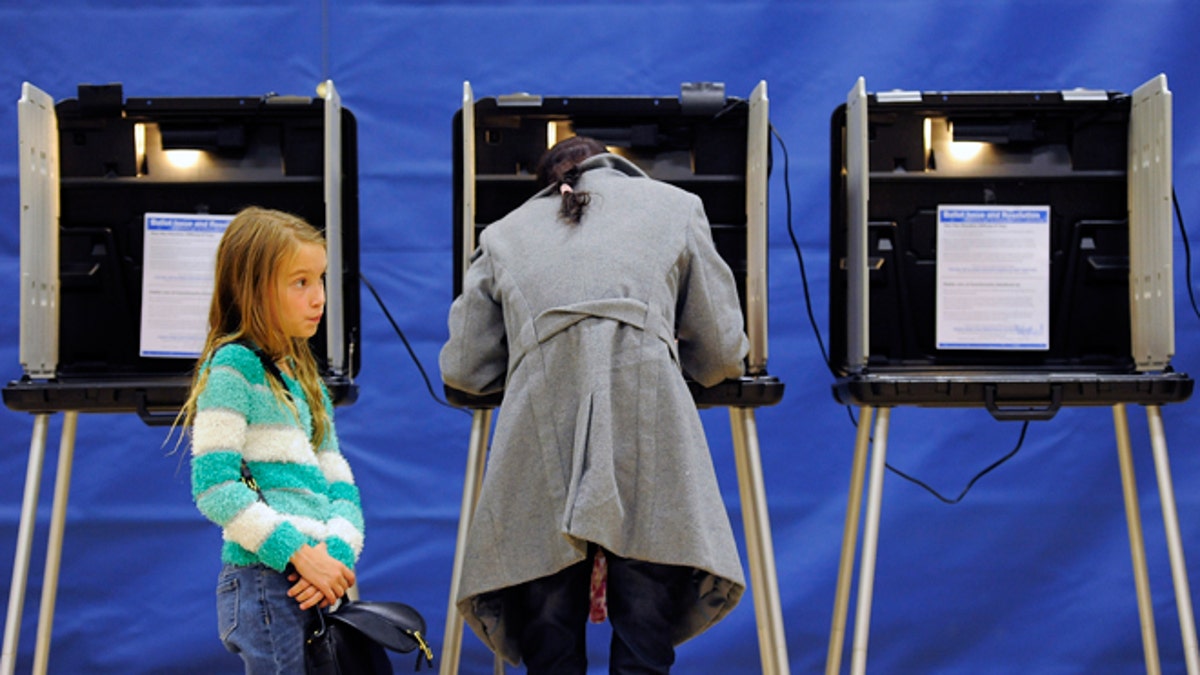
Nov. 4, 2014: Alice Kunde, 8, left, waits for her mother Laura Kunde to vote at the Barnum Recreation Center in Denver. (AP Photo/Chris Schneider)
When the Berlin Wall came down 25 years ago this week, people in the Soviet Bloc gained something even more valuable than a right to vote: a free market.
Democracy is definitely better than taking orders from Communist dictators. But real freedom means doing what you choose as an individual, not waiting for the rest of society to vote on whether you can.
In politics, winners get to tell the losers what to do.
[pullquote]
In the marketplace, you buy what you want. I buy what I want. If some people want to buy movie tickets while others prefer to buy clothes for their dogs, neither side needs to worry it will lose a struggle over which option is best.
This election, as usual, there was a big push to get people to go out and vote. Yet most didn’t (more vote in presidential elections, but still less than half the population).
After elections, pundits say, “the people have spoken.” But we haven’t. Often, we just chose politicians we hated less than others.
I’m glad big-spending Democrats lost Congress. But In the grand scheme of things, was that vote such a sweeping endorsement of anyone’s political philosophy? The vote, as usual, was pretty close. Often it feels like America flips a coin.
That sounds cynical, but it’s not just cynics who have doubts about the democratic process.
Economist and law professor Gordon Tullock passed away the day before the election. But had he lived another day, he still wouldn’t have voted last week. He refused to vote, in part because the branch of economics he helped create -- “public choice” -- helped convince him that people behave just as selfishly and foolishly when they vote as when they make any other kind of decisions, but with more devastating effects on other people.
At the Cafe Hayek blog, economist Don Boudreaux writes that it’s good if people don’t vote because by avoiding politics they “come to depend more on personal initiative and less on untrustworthy, power-craving strangers.”
Well said.
We don’t suddenly become wiser and nobler when we step into the voting booth. If anything, the decisions we make there are more ignorant and reckless than the ones we make when buying a car.
You probably know more about what kind of car you want than about what sort of laws to impose on your neighbors. It’s another reason why most of life is best left to free individuals.
The left treats markets with contempt and political processes as if they’re sacred. Then, to explain why politics disappoints, they pretend that money sullies politics.
They’re upset because the Supreme Court said money can be spent on ads that inform voters of different factions’ views. It turned out that Democrats were the biggest spenders, but that doesn’t stop them from complaining that evil Republican tycoons used money to manipulate voters who would otherwise have chosen the candidates decent Democrats want them to.
Republicans, meanwhile, get upset if money is used to bet on things. There once was a wonderful online predictions-market called Intrade. It allowed people to bet on future events, including elections.
Intrade’s odds were much more accurate predictions than those made by pundits and pollsters. That’s because there is wisdom in large numbers, and because Intrade bettors put real money at risk (unlike pundits and water-cooler prognosticators).
But American regulators threatened Intrade with litigation, and the site closed. There’s still another prediction market, based in England, called Betfair, but it’s confusing and not as useful to Americans. Shutting down Intrade leaves us all less informed and more dependent on the political elite.
I get the creepy feeling that’s the way the elite likes it. They want us to think of our grubby little individual lives -- full of buying and selling, of self-expression and risk-taking -- as something inferior to the exalted political process.
I think our individual lives matter, not just those few moments we spend in the voting booth picking the lesser of two evils to run other people’s lives.
